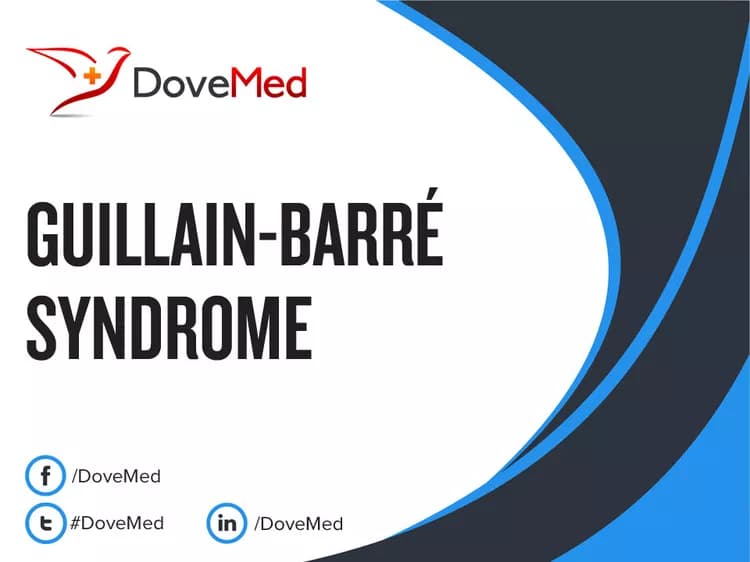
Guillain-Barré Syndrome
What are the other Names for this Condition? (Also known as/Synonyms)
- GBS (Guillain-Barré Syndrome)
- Landry's Ascending Paralysis
- Post-Infectious Polyneuritis
What is Guillain-Barré Syndrome? (Definition/Background Information)
- Guillain-Barré Syndrome (GBS) is an inflammatory autoimmune disease that affects the peripheral nervous system
- The disorder is characterized by ascending weakness and paralysis, often beginning in the feet and legs and progressing to the trunk, arms, and face
- In severe cases, paralysis of the muscles involved in breathing can lead to respiratory failure
- In over two-thirds of the cases, a respiratory or GI infection precedes the development of this autoimmune disorder, which can be confirmed through study of the signs and symptoms and a cerebral fluid analysis
- The first line of treatment of Guillain-Barré Syndrome is the administration of IVIG (intravenous immunoglobulin), with plasma transfusion, as required
- The prognosis is generally good with appropriate therapy, though in a small number of cases, a relapse may occur
Who gets Guillain-Barré Syndrome? (Age and Sex Distribution)
- Children and adults of all ages may be affected by Guillain-Barré Syndrome; though the highest incident rate is seen in individuals 50-74 years of age
- There is a slightly higher incidence in males than females
- GBS is found worldwide during all seasons, affecting all racial and ethnic groups
What are the Risk Factors for Guillain-Barré Syndrome? (Predisposing Factors)
The risk factors of Guillain-Barré Syndrome may include the following:
- Guillain-Barré Syndrome frequently occurs 1-3 weeks after a respiratory or gastrointestinal infection (in approximately 70% of cases)
- The known triggers include infection with the following bacteria and viruses:
- Campylobacter jejuni (bacteria causing gastrointestinal infection)
- Cytomegalovirus
- Epstein-Barr virus (viruses causing infectious mononucleosis)
- Mycoplasma pneumoniae (bacteria causing atypical pneumonia)
- Rarely, vaccinations for rabies and influenza have triggered GBS
It is important to note that having a risk factor does not mean that one will get the condition. A risk factor increases ones chances of getting a condition compared to an individual without the risk factors. Some risk factors are more important than others.
Also, not having a risk factor does not mean that an individual will not get the condition. It is always important to discuss the effect of risk factors with your healthcare provider.
What are the Causes of Guillain-Barré Syndrome? (Etiology)
- Guillain-Barré Syndrome is caused by destruction of myelin, the coating around peripheral nerve fibers, by the immune system
- Inappropriate activation of the immune system during the preceding infection or vaccination is thought to result in the production of antibodies that attack myelin
- Loss of myelin causes dysfunction of nervous system signaling, which leads to weakness and paralysis
What are the Signs and Symptoms of Guillain-Barré Syndrome?
The signs and symptoms of Guillain-Barré Syndrome are the following:
- Initially, the symptoms include numbness and weakness of the fingers and toes, and urinary retention
- This is soon followed by increasing symmetrical weakness over a period of 1-2 weeks, usually starting in the lower extremities and moving up to include the arms and face
- The symptoms are usually at their worst after 4 weeks and many patients are unable to walk, by this time
- Aches and pains of muscles in back, hips, and legs are common
- Due to paralysis of muscles involved in respiration, one-third of patients may require endotracheal intubation (breathing tube) and mechanical ventilation, until they recover
How is Guillain-Barré Syndrome Diagnosed?
A diagnosis of Guillain-Barré Syndrome may involve:
- Physical examination with detailed medical history evaluation: The diagnosis of GBS is made based on the characteristic symptoms of rapidly-acquired paralysis and CSF analysis
- Analysis of cerebral spinal fluid (CSF): CSF analysis typically shows increased levels of protein and a normal cell count, approximately 1-week after the onset of symptoms
- Electromyography studies to assess for decreased nerve conduction may be done to confirm the diagnosis
Many clinical conditions may have similar signs and symptoms. Your healthcare provider may perform additional tests to rule out other clinical conditions to arrive at a definitive diagnosis.
What are the possible Complications of Guillain-Barré Syndrome?
The following complications may occur as a result of Guillain-Barré Syndrome:
- In serious cases of GBS, complications can arise from prolonged immobilization and/or respiratory failure
- Patients that have difficulty swallowing have an increased risk for aspiration pneumonia. In such cases, endotracheal intubation may be necessary
- Patients are at risk for developing cardiac arrhythmias
- Blood pressure changes and dizziness are also common
- 3-5% of patients may have a relapse of symptoms, often following a long asymptomatic period of many years
How is Guillain-Barré Syndrome Treated?
The treatment for Guillain-Barré Syndrome could include the following measures:
- Intravenous immune globulin (IVIG), a blood product, is the primary treatment. Plasma exchange may also be used
- Heparin may be given to help prevent venous thromboembolism (blood clots) from forming as a consequence of immobilization
- Most patients are admitted to the hospital for close observation
How can Guillain-Barré Syndrome be Prevented?
Currently, there are no known methods to prevent Guillain-Barré Syndrome occurrence.
What is the Prognosis of Guillain-Barré Syndrome? (Outcomes/Resolutions)
- More than 95% of patients recover from Guillain-Barré Syndrome, although recovery may take several weeks to months
- Recovery is fairly spontaneous and typically occurs 2-4 weeks after patient reaches their maximal weakness
- 10% of patients have permanent residual weakness or numbness, usually of the feet and toes
Additional and Relevant Useful Information for Guillain-Barré Syndrome:
The following DoveMed website link is a useful resource for additional information:
https://www.dovemed.com/diseases-conditions/immune-related-disorders/
Related Articles
Test Your Knowledge
Asked by users
Related Centers
Related Specialties
Related Physicians
Related Procedures
Related Resources
Join DoveHubs
and connect with fellow professionals

0 Comments
Please log in to post a comment.